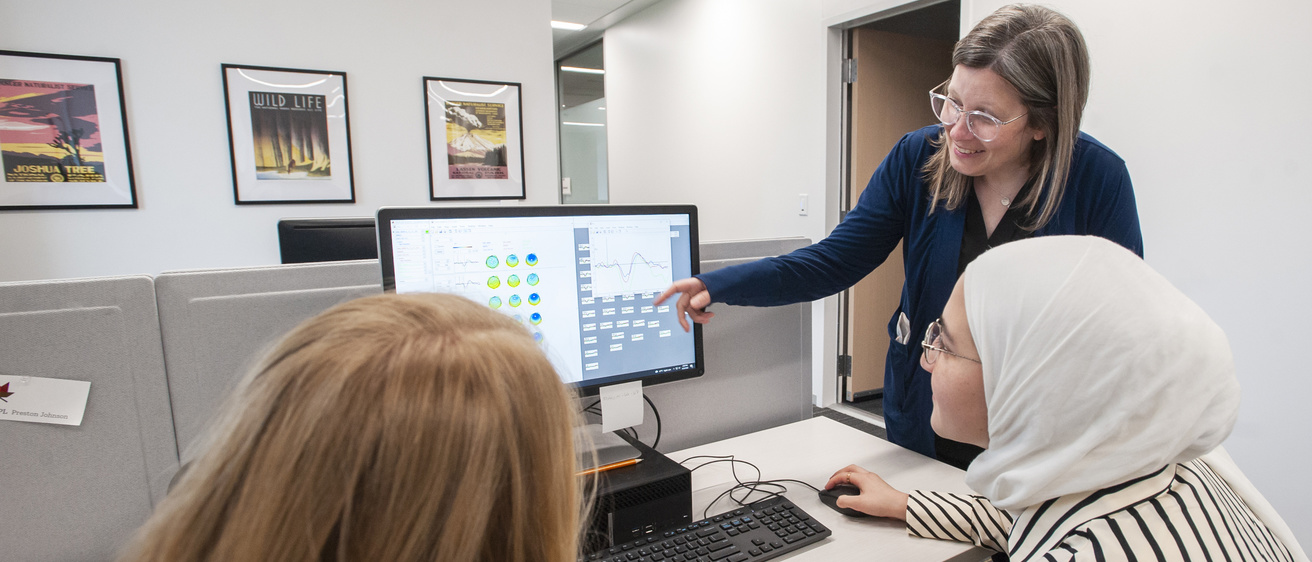Main navigation
Earn a BA in Psychology
Understanding human behavior, thoughts, and decision-making will empower you to be an outstanding helper, leader, employee, and colleague.
The BA track of the psychology major prepares students to enter the workforce or pursue a graduate degree. You’ll learn from top researchers and educators and be empowered to apply your psychological knowledge in a wide variety of careers including management, marketing, social services, human resources, health care, and other people-centered fields.
Requirements & program planning
Program requirements
The BA program requires 34 semester hours of psychology and is intended for those students who are pursuing a broad undergraduate education with a special emphasis in psychology. Students planning to enter a graduate program in a field that emphasizes applied preparation more heavily than research training may wish to choose the BA program. The BA program may be combined with specialized work in one or more other disciplines (e.g., education, social work, business, journalism, nursing). Transfer students and students who have changed majors after already fulfilling most of the General Education Program may find the BA program particularly suitable. The BA program involves an introductory psychology course, a behavioral neuroscience course, two courses in research methods and data analysis, and lower and upper level courses in psychology. Students entering the BA program must also complete either a statistics or a computer science course and at least 9 semester hours of coursework at the University of Iowa in a second area of concentration. Courses used to satisfy the second area of concentration may not be used to satisfy the College of Liberal Arts General Education Program, but a second major or a minor in any discipline will satisfy the requirement.
Course requirements
| Course number | Course name | Semester hours |
|---|---|---|
| PSY:1001 | Elementary Psychology | 3 |
| PSY:2701 | Introduction to Behavioral Neuroscience | 4 |
| PSY:2811 | Research Methods and Data Analysis in Psychology I | 3 |
| PSY:2812 | Research Methods and Data Analysis in Psychology II | 3 |
| Lower-level courses (complete all four) Prerequisite: Completion of PSY:1001 | ||
| PSY:2301 | Intro to Clinical Psychology | 3 |
| PSY:2401 | Intro to Developmental Science | 3 |
| PSY:2501 | Intro to Social Psychology | 3 |
| PSY:2601 | Intro to Cognitive Psychology | 3 |
Upper-level electives (select three courses) Note: Not all courses are available each semester (or summer session). | ||
| Cognate requirement (select one from the following list) | ||
| CS:1020 | Principles of Computing | 3 |
| CS:1110 | Introduction to Computer Science | 3 |
| STAT:1020/PSQF:1020 | Elementary Statistics and Inference | 3 |
| STAT:1030 | Stats for Business | 4 |
| STAT:3510 | Biostatistics | 3 |
| STAT:4143/PSQF:4143 | Intro to Statistical Methods | 3 |
| BIOS:4120 | Intro to Biostatistics | 3 |
Second area of concentration At least 9 semester hours of graded coursework at the University of Iowa in a single department beyond courses used to satisfy the College of Liberal Arts General Education Program requirements. Transfer coursework form other institutions may not be used for the Second Area of Concentration. | ||
Program planning information
Course sequence for the BA program
First year students should enroll in Elementary Psychology and General Education courses. From there, students continue to work on General Education courses and a combination of Research Methods and Data Analysis courses and lower level Psychology courses. Finally, students complete upper-level Psychology electives.
It is important for students to compete the Psychology Core as early as possible as it is not possible to move on to upper-level major coursework until these courses are completed.
Please note that students must earn a C- or better in Research Methods and Data Analysis I (PSY:2811) and the corresponding lower level course prior to enrolling in more advanced courses.
Enriching the BA program
Students in the BA program who plan graduate study in psychology or a related discipline should consider enriching their preparation with electives, minors, certificates or experiential learning. Students should consult carefully with their adviser in planning.
Create your academic path
You'll find degree overviews, requirements, course lists, academic plans, and more to help you plan your education and explore your possibilities.
Current course list
The MyUI Schedule displays registered courses for a particular session and is available to enrolled students. The list view includes course instructors, time and location, and features to drop courses or change sections.
